
Nature of work
A seismic interpreter combines the use of 2D, 3D and 4D models with their geological knowledge to calculate the depth and outline of underground formations in order to make estimates of mineral or carbon deposits. These are used by energy or minerals extraction companies or to inform environmental assessments or geological research if working in other settings.The tasks typically involve:
· Using data to generate maps and cross sections of the earth's structure to locate oil-bearing strata, etc.
· Analyzing and generating scientific and numerical data.
· Working with reservoir engineers to evaluate hydrocarbon prospects - looking at how much oil and gas there is, how easy it is to get to, and what difficulties and hazards might be encountered.
· Predicting any changes, movements and flow in the rock structures where the hydrocarbons are present.
· Interpreting seismic data for environmental assessments and geological research.
· Writing scientific reports.
· Delivering technical presentations to clients at the end of a project.
· Using specialized equipment to assess the physical properties of rock.
Environment of work
Working hours are mainly from 8:30am to 3:30pm, but additional hours may be required at key stages during a project or when a deadline must be met. Majority of the work is office based. Many roles are permanent, but companies also offer long-term contracts with higher rates of pay. Recruitment depends on the changing demand for oil, which is currently buoyant.Geographical mobility is important, as exploration and production sites move to new locations around the world. Large companies provide accommodation and support for families in residential postings around the globe. English is usually the language used for business in offices worldwide.
The work may not be stressful on a daily basis, but there will be extremely busy times, such as when a drilling proposal is being put together or when a problem arises. Occasionally, the work can become dangerous.
Professional life
Career direction and development begins as soon as a candidate join a company. Many companies do not recruit people directly into seismic interpreter, field seismologist or petroleum engineer roles. Not only is there some interchange between different job titles, but some companies recruit people who have suitable qualifications, IT skills and potential, and then assess where their skills will be best used through the initial on-the-job training. A career path may depend on whether an employee enters the field from a geology background or a geophysics background.Working on different exploration and production projects in varied locations will increase an employee’s professional expertise and the ability to deal with new and unforeseen problems. It may also clarify his/her personal preference and interest in the exploration or production aspects of the business.
Typical starting salaries: from 25000 SYP
Getting the job
A good honours degree is essential and relevant subjects include physical, mathematical and applied science. In particular, the following subjects may improve his/her chances.· Geology.
· Geophysics or Geotechnology.
· Physics.
· Applied physics.
· Mathematics.
· Earth sciences.
A candidate can find many masters degree in High Institute For Seismic Researches at Damascus University.
Although it is sometimes possible to enter the role with a first degree, many companies only consider applicants who have a postgraduate qualification in a specialized subject, such as Geoscience or Petroleum geology.
Skills
The work may be largely technical, but candidates need to show evidence of the following general competencies:· Resilience.
· Good communication skills and the ability to interact with internal and external clients.
· Excellent team working skills.
· The ability to work well alone.
· Good IT skills.
· Strong numerical, analytical and logical skills.
· The ability to work in and an appreciation of different physical and cultural environments.
A number of the major oil and petroleum companies, including BP and Shell, offer summer and one-year internships.
Sources and references
www.iris.edu/seismon, world Seismic Monitor damascusuniversity.edu.sy/ins/hiesr, High institute for seismic researches.
Arab Standard Classification of Occupations, 2008, Ed. Arab Labor Organization
